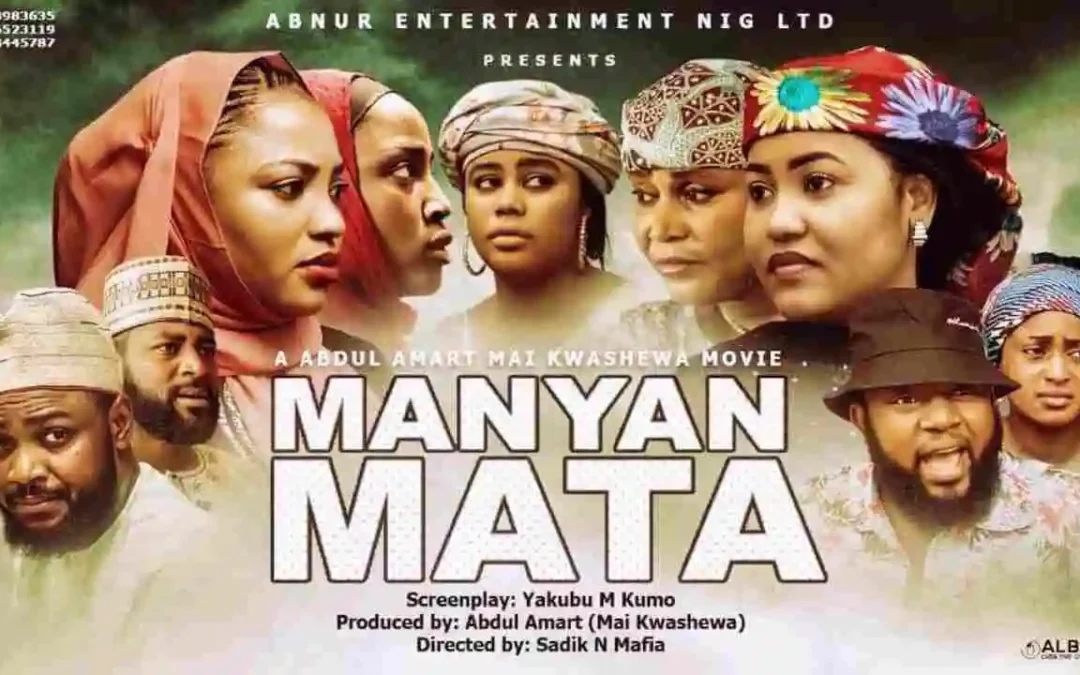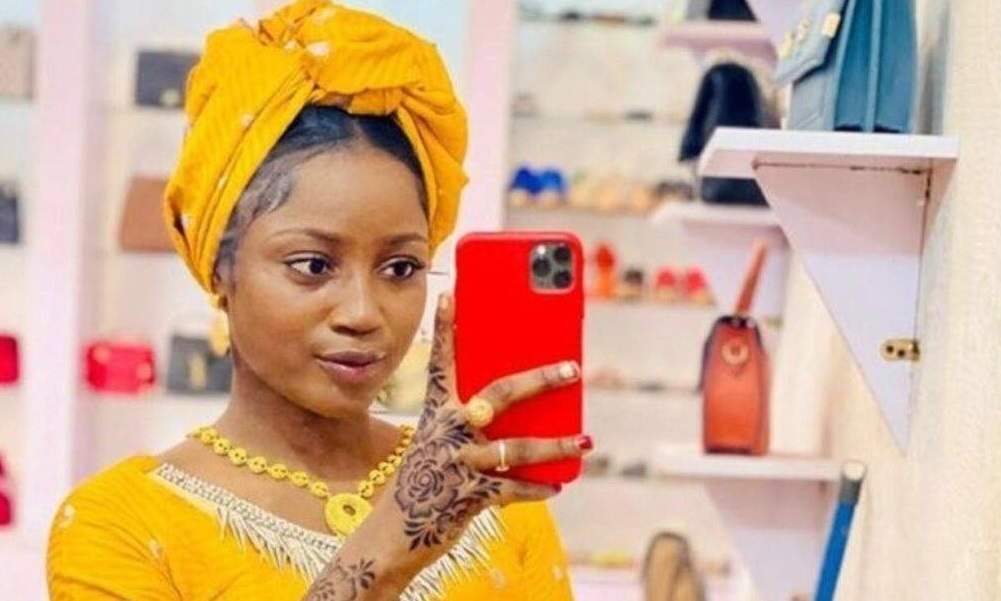
Manyan Mata: Kannywood Movie That Promises Enlightenment
Every day, Northern Nigerian literary platforms like Northpad, Poetic Wednesdays, and the Daily Times are brewing literary pieces on issues concerning the northern part of Nigeria with extensions to the country at large.
Their goal remains to enlighten the public about the happenings of the region concerned as well as put out their suggestions on ways of tackling trending or old-age issues. This is not only admirable on their part, but a necessary approach to combating ignorance as a gaslighter of evil.
Despite the effort of these literary platforms, there is a recycling of the same issues being thoroughly penned. Particularly because there seems to be a gap between where the issues are dominant and the road the vehicles carrying the literary baggage are following.
The entertainment industry of Nigeria and the north in particular has been responsible for the theatrical manner in which it portrays social issues. Multiple shows and movies have boldly chewed on issues individually or collectively. This and content from other media has sedimented to form a layer on which ‘Manyan Mata’ forms.
Manyan Mata is a Hausa movie filmed in Kaduna State featuring popular Actress ‘Hadiza Gabon’ who operates in a private partnership with Aisha Tsamiya. Together, they explore the local tyranny happening in the places around them. For the first season which ended at the beginning of May, it has captured problems concerning women, children, and youth.
Perhaps, the most special thing about Manyan Mata is that the authorship and directing crew have found a way of collecting major individuals and issues into one collection as a single movie. The movie in its effort to excel has casted some or all of its most veteran actors and actresses, managing to harmonize tensions existing between some of them off-camera.
The movie which premieres on Tuesdays on YouTube and other times on TV channels has gathered so many fans along all social classes of people online and offline. Currently, on its season one break, followers and fans are still discussing its prolific lessons and looking forward to seeing more. Already, reviews from popular social media personalities and blogs are appearing by the day, viewing and reviewing the show.
This article will explore some of the major issues highlighted in Season One of Manyan Mata according to the trending and old-aged norms identified in Northern Nigeria affecting women, youth, and children. These will be discussed under the following headings:
- Education
- Marriage
- Poverty
1. Education
As mentioned earlier, if ignorance is the gaslight or evil, then education is its extinguisher or at least its oxygen mask. In any society, education is of paramount importance be it for a male, female, or child. Unfortunately, some people do not share this belief.
While some do not place value entirely on education, others do not dim it a priority for the women folk and the youth.
The movie’s first scene opens at an extended family home where the head places no value on women’s education and has neglected even the male sons to acquire Western education.
The character head of the family believes that education should be strictly religious, leaning firm on the old fashion way of sending away young boys to the street begging under the guise of ‘Almajiranci’. This belief has led him to a path of extremism where he is ready to lose his sons in the process.
Although Almajitanci is believed to be a good old-fashioned way of strictly impacting Quranic knowledge to youth, it’s a harsh reality that has been plunging northern Nigeria, with no hope of remedy.
Whatever happens on the streets does not stay on the street and a hungry youth is most definitely an angry youth. The effects of starvation on young boys on the streets draw a long-lasting mark on their morals. They are utilized by cunny politicians in search of idle hands and hardened hearts to execute all sorts of political thuggery and terror.
On the same streets of Almajiranci, children are left to fend for themselves by begging for food, working overtime for their so-called teacher on his farms, and being abandoned to the mercy of the elements. These symptoms are only characteristic of slavery and not enlightenment.
Of course, the movie portrayed all these difficulties faced by these children with the climax revolving around a violent physical abuse faced by one of the children and their masters. Hadiza Gabon and Aisha Tsamiya were soon to learn of the abuse through the media and interfered in the household where the victim came from.
2. Marriage
The biggest problem surrounding women in marriage is the phobia of divorce.
Marriage to the northern lady is of paramount importance religiously. Culturally, it is the datum from which all her achievements are measured. Without marriage, all a lady’s achievements are not deemed worthy of accolades. This phobia of not getting married forces ladies into choosing undeserving suitors, in an attempt to dodge forced marriage, another unpleasant fate. But perhaps even if a lady were to find a groom first, her parents in desperation to wrap up the union with haste, underperform the most crucial aspect of marriage rites which is ‘bincike’ – a method of profiling the prospective groom through information hunting. Once the bride is married off, the only way out for her is divorce, and divorce is culturally prohibited.
Religiously, Islam allows divorce as a permitted but most frowned upon act and this has culturally been up a notch higher. A woman is expected to stay married to an abuser, womanizer, in severe poverty and any harsh reality in the North, simply for the stigma waiting at the door of the society should she decide to step out.
The movie expounds a great deal on the amount of physical and mental abuse suffered in silence by women.
Manyan Mata compounds this issue of fear of divorce to the resolve of drug abuse experienced by a woman. A woman whose fear of her patriarchal father and husband has driven her into depression and near mental breakdown after being divorced.
Another interesting issue raised by Manyam Mata is the ugly tendency for women to be the cause of woe to their fellow women especially as stepmothers and mothers-in-law – an issue that needs an in-depth analysis another day. In the movie, a jealous stepmother has denied her promising stepdaughter the right to attain education simply because of jealousy – the act which pitches her own biological daughter and husband against her.
However, the promising stepdaughter in her academic excellence, catches the eyes of the patriotic women duo. They soon intervene in her issue, stepping in to cushion blows landed by her stepmother and striving to make her life better.
3. Finance
Poverty is a plague and the only cure is funds. People no longer differentiate between the good from the bad ways of obtaining those funds. As such, they follow whatever means possible to acquire money. In an economy where people birth more mouths than they can feed, the children become part of the food hunters. They are forced to hawk on the streets to help their parents cater for them.
Street hawking has penetrated into the morrows of some parents in northern Nigeria. They choose to ignore or are blind to its horrors. Children and young girls are sent into the streets to mingle with all kinds of people with unknown intentions. It is at the hem of this problem that Manyan Mata cleverly stitched the issue of rape. A parent of the victim has all but handed her to the clutches of the monsters.
Before the season ended, a very emotionally crushed young lady was left eternally bruised to the number one ills of girl child hawking in northern Nigeria which, fortunately, can be reformed.
Conclusion
Manyan Maya in general has commanded the attention and respect deserving of the efforts of its overall filming crew.
It has cast a halo around the social problems faced by youth, women, and children including Almajiranci, domestic violence, depression, rape, political thuggery, and divorce are all issues being addressed concurrently
More goodies promise to be on the way and viewers of all social classes are in heightened anticipation. We expect and hope that Manyam Mata is the vehicle that delivers the message home to all neighborhoods falling prey and predator.






